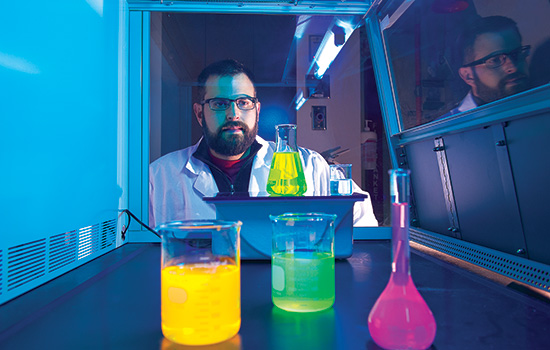Todd Pagano
Elizabeth Lamark/RIT Production Services
Todd Pagano was named 2012 U.S. Professor of the Year.
Todd Pagano, an associate professor and director of the Laboratory Science Technology program at the National Technical Institute for the Deaf, was named 2012 U.S. Professor of the Year by the Council for Advancement and Support of Education and the Carnegie Foundation for the Advancement of Teaching. Pagano was selected from more than 300 nominations. Pagano began teaching at RIT in 2002 and puts students first in every aspect of his job, from his research to his creative demonstrations in the classroom. The more than 100 students who have graduated from the two-year Laboratory Science Technology program either continued to pursue four-year degrees or began working as laboratory technicians in areas such as environmental analysis, food analysis, biotechnology and forensics.
I think I knew I wanted to be a scientist first and then a teacher. But it was much to my surprise. I was working on my doctoral degree and I went to my mother’s retirement party. She was a teacher in Victor (N.Y.), where I went to school. After the ceremony, my second-grade teacher came up to me and asked me if I could guess what I said that I had wanted to be when I grew up. My immediate response was it had to be a baseball player. She said, ‘No, you said you wanted to be a scientist.’ And, as proof, she had a picture I had drawn of a guy with beakers and in a lab coat.
The teaching came later. At some point I started to like to get up in front of my classes and give presentations and teach others about research topics. I enjoyed it and started to think, ‘Hey, I’m pretty good at this.’
While I was finishing up my doctorate (Ph.D. in chemistry from Tufts University) somebody sent me the job description for this position here. It had a list of very specific things they wanted the new hire to have. I was stunned at how well I satisfied the lengthy list, except for the bottom bullet, which said ‘should know sign language,’ which I did not.
I was hired to teach in the Laboratory Science Technology program and to be the founding director. This was an opportunity to build an entire program, to learn a new language, a new culture, which was exciting for me. The decision to work with this population of students has had a profound and positive impact on me.
I really wanted to have direct communication with my students. That was the motivation for me to learn sign language. As a result, I picked up sign language quickly enough where by my second quarter I was teaching my own courses using sign language.
I think a classroom has to be student-centered. If you involve the students in a student-centered way, they are going to take ownership of their own learning process not only in the courses you are teaching but hopefully in subsequent courses. It’s a lifelong learning skill. You are teaching students how to be productive learners unto themselves.
When you get a concept through to a student, it changes their lives. It can change their lives if it means they get a job. So I will teach it 10 different ways if I have to in order to get the concept across.
I think I could see early on that there is a place for these students in scientific labs. Getting there was a challenge because you have to build these industrial relationships. It’s hard for students to just cold call companies or send their résumés and get jobs. So many jobs are based on networking. But I could see how this program could be very successful and provide needed scientists to the workforce.
The attention I have gotten has been good for NTID. That’s what I am most happy about. It gives me a national platform, a stage where people will take notice when I talk about the things I’m passionate about, which is hiring these deaf and hard-of-hearing students into science careers. Don’t be reluctant to do it. They are good. You are going to be satisfied. It is going to make a difference for you like it did for me.
I want to be remembered as a professor who legitimately cared. If I haven’t convinced these students that I take an interest in their education or in their success after graduation, I haven’t done my job. I hope that’s how they remember me. This guy was funny. This guy was a good teacher. He helped me learn. But more than anything, he cared about my success in more ways than just the classroom.














